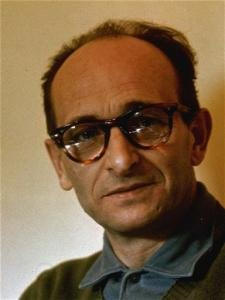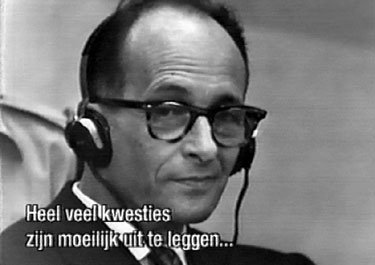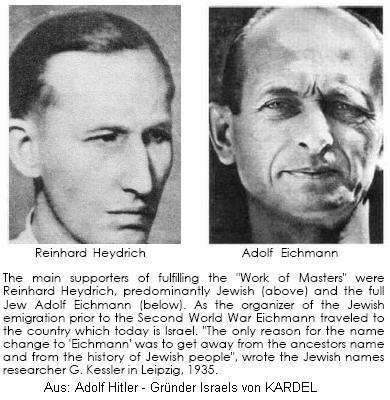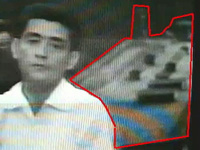

Adolf Eichmann
[back] Nazi list [back]
Holocaust
revisionism
Was Adolf Eichmann kidnapped by Mossad for his involvement in the Holocaust? It seems that German tax money was used to build Dimona and that German scientists helped the Israelis obtain the atomic bomb. Did Eichmann play a role in this? Argentinean whereabouts of Eichmann were known to the BND and the CIA at the beginning of the 50s, with Mossad no doubt also informed.
The Eichmann Gambit By George Brewer
[1992] The Suppressed Eichmann and Goebbels Papers By David Irving



[1996] Adolf Hitler -
Founder of Israel: Israel in War - With Jews by
Hennecke Kardel
http://picasaweb.google.com/Hexer.Ketzer/OkkulteNazis#

Episode 28: Confessing Germans part 2: Adolf Eichmann, Franz Suchomel. Quicktime | WMV. Adolf Eichmann purposely said the most ridiculous things in his 1961 trial. And the reporters at the New York Times amazingly believed him. It's amazing what people will believe when evil is in the equation. ONE THIRD OF THE HOLOCAUST

Episode 8: Eliyahu Rosenberg. Quicktime | WMV A Treblinka witness at the Eichmann trial in 1961 makes some mistakes on the witness stand. ONE THIRD OF THE HOLOCAUST
Book
The Real
Eichmann Trial (.PDF) by Paul Rassinier
Quotes
Simon Wiesenthal....With
the cooperation of the Israeli, Austrian, former West German and other
governments, ferreted out nearly 1,100 Nazi war criminals, including Adolf
Eichmann.1
"You bring up this recurrent theme of German Nazi-Zionazi collaboration," I said. "This is a fairly new concept to me." "And rightly so," he said, "for that is just the way the Zionazis who control the media want their collaboration to be: secret. Eichmann was one of their weak links. That's why they had to kidnap him from Argentina and murder him in Israel. They locked him in a glass box in the courtroom, supposedly for his protection, but really to keep him from hearing the real questions and giving real answers. Eichmann was a fool. He did not even know that he had a dangerous secret, for he had done nothing wrong. He should have kept his mouth shut and gone into hiding when he heard about the Zionazis' murder of his jewish counterpart, Joel Brandt, in Israel." "So, innocence can be deadly," I said. "Yes," he agreed, "the guilty know why they should cover their tracks and they know how to do it." "So what was Eichmann's role in German Nazi-Zionazi collaboration?" I asked. "He worked with Joel Brandt and others to smuggle jews out of Europe and into Palestine, against the wishes of the British who governed the territory under a mandate." "Would Eichmann have known about the Ha'arev or Transfer Agreement which allowed jews emigrating from Germany to take their wealth with them in the form of German-made goods?" I asked. "Another reason for his judicial murder," said Ginsburg. An Interview With JOSEF GINSBURG by Eric Thomson
Certainly the most bogus "memoirs" yet published are those of Adolf Eichmann.
Before his illegal kidnapping by the Israelis in May, 1960 and the attendant
blaze of international publicity, few people had ever heard of him . He was
indeed a relatively unimportant person, the head of Office A4b in Department IV
(the Gestapo) of the Reich Security Head Office. His office supervised the
transportation to detention camps of a particular section of enemy aliens, the
Jews. A positive flood of unadulterated rubbish about Eichmann showered the
world in 1960, of which we may cite as an example Comer Clarke's Eichmann: The
Savage Truth. ("The orgies often went on until six in the morning, a few hours
before consigning the next batch of victims to death," says Clarke in his
chapter "Streamlined Death and Wild Sex Orgies," p . 124).
Strangely enough, the alleged
"memoirs" of Adolf Eichmann suddenly appeared at the time of his abduction to
Israel. They were uncritically published by the American Life magazine (November
28th, December 5th, 1960), and were supposed to have been given by Eichmann to a
journalist in the Argentine shortly before his capture -- an amazing
coincidence. Other sources, however, gave an entirely different account of their
origin, claiming that they were a record based on Eichmann's comments to an
"associate" in 1955, though no one even bothered to identify this person. By an
equally extraordinary coincidence, war crimes investigators claimed shortly
afterwards to have just "found" in the archives of the U.S. Library of Congress,
more than fifteen years after the war, the "complete file" of Eichmann's
department.
So far as the "memoirs" themselves
are concerned, they were made to be as horribly incriminating as possible
without straying too far into the realms of the purest fantasy, and depict
Eichmann speaking with enormous relish about "the physical annihilation of the
Jews." Their fraudulence is also attested to by various factual errors, such as
that Himmler was already in command of the Reserve Army by April of 1944,
instead of after the July plot against Hitler's life, a fact which Eichmann
would certainly have known.
The appearance of these "memoirs"
at precisely the right moment raises no doubt that their object was to present a
pre-trial propaganda picture of the archetypal "unregenerate Nazi" and fiend in
human shape. The circumstances of the Eichmann trial in Israel do not concern us
here; the documents of Soviet origin which were used in evidence, such as the
Wisliceny statement, have been examined already, and for an account of the
third-degree methods used on Eichmann during his captivity to render him
"co-operative" the reader is referred to the London Jewish Chronicle, September
2nd, 1960. More relevant to the literature of the extermination legend are the
contents of a letter which Eichmann is supposed to have written voluntarily and
handed over to his captors in Buenos Aries. It need hardly be added that its
Israeli authorship is transparently obvious. Nothing in it stretches human
credulity further than the phrase "I am submitting this declaration of my own
free will"; but the most hollow and revealing statement of all is his alleged
willingness to appear before a court in Israel, "so that a true picture may be
transmitted to future generations." Did Six Million Really Die? by Richard Harwood
Zionists in Germany worked at organizing schools for children in the Jewish language, workshops for young people, etc., to help prepare people to emigrate at some point to Palestine. The Zionists were interested only in emigration to Palestine and did everything they could to make sure that outside of Palestine no Jews were admitted. The Nazis were interested in getting the Jews to emigrate wherever they could. Nevertheless, co-operation continued between the Zionists and the Nazis, such people as Adolf Eichmann, Golda Meir and David Ben-Gurion, until 1942 when the Zionist leaders were of the opinion they had reached their goal. Burg stated that even at that point Germany's defeat could be seen and the Zionists became like "rats leaving a sinking ship." (26-6880 to 6884) [Joseph G. Burg] The 'False News' Trial of Ernst Zündel -- 1988
When this journalist telephoned me, I said, "I can't tell you my own impression about these figures, but what I will tell you is that Adolf Eichmann himself said that [Auschwitz commandant] Rudolf Höss' figures were grossly inflated, and that Eichmann thought that Höss was an outrageous liar." [1992] The Suppressed Eichmann and Goebbels Papers By David Irving
"Well, Eichmann says he witnessed mass shootings in Russia, but Eichmann's papers are quite plain: there's no mention at all of gas chambers." [1992] The Suppressed Eichmann and Goebbels Papers By David Irving
The line of defense of the Jewish community was that what I had was
not all that serious; and, please, no further publicity. This made me
begin to wonder. What was it they didn't want published? Why was it, I
asked myself, that when the Eichmann memoirs came out in 1985, first of
all, nobody was willing to publish them except Druffel Verlag in
Germany, and Planeta in Argentina, but no mainstream publisher in Europe
or the United States? Here, after all, are the memoirs of "the biggest
mass-murderer of all time," apparently, and yet for some reason they're
being swept under the carpet.
First of all, Adolf Eichmann is quite plain throughout these papers that
the word Endlösung, or "final solution," meant only one thing to him,
and that was Madagascar. When he addressed his mind to the "final
solution of the Jewish problem" in the late 1930s and early 1940s, it
was quite plain to him that it was only a plan to sweep all the Jews of
Europe aboard boats and transport them lock, stock, and barrel down to
Madagascar, where they would be on an island where they couldn't bother
any of their neighbors and where none of their neighbors could bother
them. I've always said and I say it here again -- even though I risk
making a few enemies -- that I think that would have been an ideal
solution to a perennial world tragedy.
The second interesting thing that emerges from Eichmann's own
papers is that he's chewing over in his mind-- he's frightfully
repetitive -- he keeps on coming back, again and again, in his
manuscripts and in these conversations to who was behind it, and what
was behind it. What was behind the "Holocaust" (if we can use that word
loosely here now)? He keeps coming back to the appalling thought: Did
they manage to use us? Did the Zionists use the Nazis to further their
own ends? Was the Holocaust something that they themselves inflicted on
their own body, in order to bring about their Zionist cause in the long
run? [1992] The Suppressed Eichmann and
Goebbels Papers By David Irving
This was Eichmann's theory, at the end of his life (effectively, because a year or two later he was kidnapped and a year after that he was at the end of a rope in Israel). "Did they manage to use us?" He keeps on coming back to it, and every time he comes back to it becomes more and more plausible to him. And perhaps this is the reason why the Eichmann papers were not supposed to see the light of day [1992] The Suppressed Eichmann and Goebbels Papers By David Irving
He also says, "Besides, we had by this time already learned of the Jews' plans for Germany." He mentions explicitly the book by Theodore Kaufman, Germany Must Perish. This is most interesting, because in the Goebbels diaries of August 1941 (which have also not yet been published), Goebbels also mentions Kaufman's book as justification. [1992] The Suppressed Eichmann and Goebbels Papers By David Irving
Eichmann's comments on the Höss memoirs are annihilating. Reading
where Rudolf Höss is saying that two and a half million Jews have been
liquidated at Auschwitz, the camp where he was commandant, Eichmann
comments, "Where does Höss believe that he got these two and a half
million Jews? Not from me. Because to have liquidated two and a half
million decrepit, elderly, unworkable Jews, I must have had to feed to
him three, four, five, six or seven million Jews in that space of time,
and from the transport point of view alone this would have been totally
impossible."
You see, the memoirs of Eichmann are very useful in this respect. He
was the transport specialist whose job it was to round up the Jews in
Hungary and Slovakia. and ship them off to Germany for forced labor and
for dissipation to the other labor camps. He knew that shipping off
millions of Jews wasn't something you do at the snap of your fingers:
you had to have conferences with the railway officials and with the road
officials, and with the guards and with everybody else who was going to
be involved in all this. You had to provide the food for the transports
which were going to be on the rails for four or five or six days. All
this had to be prepared and planned with typical German bureaucracy and
method, and that took meetings and conferences. And Eichmann said, "If
you're going to ship five or six million Jews across Europe to Auschwitz
at that time, let me tell you how many trains that would have taken,"
and he worked out how many trains it would have taken, because he knew.
"You're not only going to have trains going that way full of Jews,
you're going to have empty trains coming back. And you're going to have
to have a circulation time, a time where they're unloading at one end, a
time where they're loading at the other end... You're going to need so
many thousands of wagons" of rolling stock. He worked out exactly how
much rolling stock would have been needed, in these memoirs, and he
said, "This alone proves that Rudolf H_ss was talking through his hat.
These figures are totally fantastic, and what the hell is Höss up to?"
That is a brief, lurid summary of what Eichmann writes as he's sitting
in what he believes to be safety in the underground in Argentina,
reading these memoirs of Höss, published in 1958.
[1992] The Suppressed Eichmann and Goebbels Papers By David Irving
He mentions also in these memoirs how he received an indirect
approach from Nahum Goldmann. Nahum Goldmann was one of the great
Zionist leaders of the postwar era. Born in Lithuania and living for
many years in Germany, he was the person who negotiated with Konrad
Adenauer the billions of German marks which subsequently went to Israel.
Eichmann mentions in these memoirs what purported to be an indirect
approach from Goldmann, pleading with him to back up the six million
figure. Anything he could do to support the six million figure, because
the Zionists needed it. You are beginning to suspect, now, why these
Eichmann memoirs should not be published.
Eichmann inspected Auschwitz. He went to Auschwitz several
times, as he recounts in his memoirs. He describes being met by Rudolf
Höss, the commandant, and he describes several grisly scenes. He
describes going past an open pit where bodies were being burned, and he
says it was an infernal sight, the likes of which he would never forget.
He describes how the commandant, Höss, tells him that they are doing
these things on Himmler's orders and that it is a sacred task that has
been imposed on the SS.
Eichmann describes many things, but what he does not once mention
during this vivid description of his visit to Auschwitz is "gas
chambers." He doesn't mention gas chambers, he just mentions the
disposal of bodies in open pits by fire, and the comments to him by
Commandant Höss. [1992] The Suppressed Eichmann
and Goebbels Papers By David Irving
we must never overlook one basic fact: this is a postwar document, and any historian can now confirm that nowhere in all the archives of the world has yet been found one wartime document referring to a Führer's order to destroy the Jews, or for that matter, one wartime document referring to gas chambers or gassings. All the documents that refer to Führer orders and gas chambers are postwar documents; statements by people in the dock at Nuremberg, memoirs written by the commandant at Krakow in Poland, and the like. You can't overlook this basic watershed between wartime and postwar documents. If there's no wartime document that says there was a Führer order, if no wartime document talks of gas chambers, then there has to be some explanation for that. [1992] The Suppressed Eichmann and Goebbels Papers By David Irving
He doesn't try to avoid describing what he's seen. He describes the
pits in Auschwitz, he describes the crematoria, just the same as Albert
Hoffmann. Four or five years ago, while going through the records of the
National Archives in Suitland, Maryland, I came across the interrogation
report of Albert Hoffmann, who was the deputy Gauleiter of Silesia, the
Gau where Auschwitz was situated. I thought he was an unimportant man,
because I didn't realize he was in Silesia, but the British,
interrogating Hoffmann, asked him if he'd ever visited a concentration
camp. Hoffmann's reply was, "Yes, I've visited two concentration camps
in my life, one at Dachau in 1936, which was organized, clean, decent
and disciplined, and the prisoners were well fed. Then again," he said,
"in 1941 (or 1942: I think, in fact, in both years), I visited Auschwitz
concentration camp with my Gauleiter, Bracht, and with the Reichsführer
SS, Heinrich Himmler."
Hoffmann went on, "Auschwitz was totally different from Dachau. The
scenes I saw there beggar description. Brutality on the worst possible
scale. I saw prisoners being beaten, I saw cadavers being cremated in
the crematorium..."
You think, "Well, this is it." You read on, thinking now you've got
it, but then Hoffmann adds, "...but what Allied propaganda is now
claiming, that is totally untrue."
So again, rather like Eichmann, you've got somebody who is prepared
to describe to a degree what he has actually seen, which, God knows,
isn't exactly decent, but he will not go the final yard and say "gas
chambers." Neither Adolf Eichmann nor Albert Hoffmann -- eyewitnesses --
describes having seen the gas chambers. So why does Höss describe the
gas chambers? I'll come back to Höss and his papers in a minute.
[1992] The Suppressed Eichmann and Goebbels
Papers By David Irving
Eichmann constantly ravages the memoirs of Rudolf Höss, as I mentioned. This is again another reason "not to publish" the Eichmann memoirs, and not to grant them any credence, because for our opponents the Höss memoirs are a keystone of the Holocaust legend. Eichmann describes the refusal of the government of Slovakia, and other countries where he operated, to intercede on behalf of their Jewish people. They were glad to get clean of them. And that again is something these people wouldn't have wanted to be published [1992] The Suppressed Eichmann and Goebbels Papers By David Irving
Eichmann's memoirs are an important element of the refutation of the
Holocaust story. I have saved this for the end: Because I'm notorious,
and because my name is on stickers around London, ("Irving speaks and
Rostock burns"), purely by chance another man came and visited me in
London only a few weeks ago, and he unwrapped an envelope, and inside
the envelope was a book. I recognized it because it's a well-known book
that we all have consulted. It was a copy of the original German edition
of the memoirs of Rudolf Höss, Kommandant in Auschwitz,
published in 1958 by the Institute of Contemporary History in Munich.
He said, "I bought this book in a German flea market only a few
months ago and I want to ask you how much is it worth."
I said, "How much did you pay for it?"
He said, "No, no, no, look. It's got handwriting all over it."
Here are some pages of it, and you can see the handwriting -- it's
got hand-written marginal notes all over it. Says one note here, "That
is a lying distortion of the facts." The handwriting is Eichmann's. The
book is Adolf Eichmann's own copy of the Rudolf Höss memoirs! I don't
know how much money this man wanted for it. I'm not a rich man, but I've
got his address; one day, perhaps, I'll make him an offer for it.
Everywhere in that book Eichmann has written his own comments. Rudolf
Höss writes, "I had a private meeting alone with Adolf Eichmann, and we
discussed the Eichmann program." Eichmann crosses this out: "A shameless
lie. I was never alone with Höss." So those of us who always doubted the
integrity of the Höss memoirs -- we wondered why Höss should have
written these things -- here in Eichmann's own handwriting we've got yet
one more piece of proof that the Höss memoirs are untrustworthy as a
source. [1992] The Suppressed Eichmann and
Goebbels Papers By David Irving